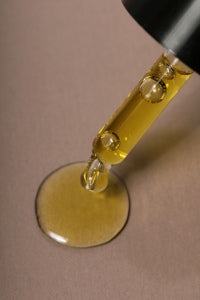What are natural oils?
Natural oils are concentrated liquids extracted from plants, flowers, seeds, nuts, and fruits. These oils contain the essence of the plant including aromas, vitamins, minerals and other plant substances. Extraction methods range from cold pressing, which is often used for citrus fruits and some nuts and seeds, to steam distillation, used mainly for flowers and herbs. These methods ensure that the oils retain their natural properties, making them rich in nutrients that are beneficial to the skin.
Natural oils have been used for centuries in various cultures for their medicinal and skin care properties. Their ability to penetrate deep into the skin without clogging the pores makes them particularly suitable for the care of the delicate and sensitive skin of children. They provide a gentle, natural way to hydrate, nourish, and protect the skin from external influences.
Why choose natural oils for your child?
 In a world where shelves are full of childcare products, it can be difficult to determine what is best for your child. Many traditional products contain synthetic additives, preservatives, and fragrances that can irritate or dry out a child's sensitive skin.
In a world where shelves are full of childcare products, it can be difficult to determine what is best for your child. Many traditional products contain synthetic additives, preservatives, and fragrances that can irritate or dry out a child's sensitive skin.
Free from harmful chemicals
Natural oils contain no artificial additives, making them a safe choice for your child's care. They provide purely natural nutrition and hydration without the risk of exposure to potentially harmful substances.
Rich in nutrients
Natural oils are rich in essential fatty acids, antioxidants, vitamins and minerals that strengthen your child's skin barrier, making the skin better protected against environmental factors.
Gentle care
The mild properties of natural oils make them ideal for daily use, even on the most sensitive skin. They can help soothe dry spots, diaper rash, and other skin irritations in a gentle way.
Versatility
Natural oils can be used in a variety of ways, from moisturizers to massage oils, making them a versatile addition to your child's skincare routine.
Safety and precautions
When using natural oils for child care, it is essential to observe safety and precautions. Natural oils are powerful and should be used with care, especially with young children and babies.
Dilution
Essential oils should always be diluted in a carrier oil before applying to children's skin. Carrier oils such as jojoba oil, almond oil or coconut oil are excellent choices. A general guideline for dilution is 1 drop of essential oil to 1 tablespoon of carrier oil for children.
Allergy testing
Always do a patch test before introducing a new oil. Apply a small amount of the diluted oil to the inside of the child's wrist or elbow crease and wait 24 hours to check for reactions.
Choosing the right oils
When choosing the right natural oils for your child, it is important to consider their specific needs and skin type. Here are some safe and effective oils for children, along with their benefits:

Jojoba oil
This oil is very similar to the natural oil (sebum) produced by our skin. It is moisturizing without being greasy, making it suitable for all skin types, including sensitive baby skin.
Argan oil
Rich in vitamin E and essential fatty acids, argan oil is excellent for hydrating the skin and improving skin texture. It is also known for its healing properties for dry or irritated skin.
Hemp seed oil
With an ideal ratio of omega-3 to omega-6 fatty acids, hemp seed oil is excellent for calming inflammation and nourishing the skin.
Rosehip oil
Known for its regenerative properties, rosehip oil helps repair scars and improve skin elasticity, making it suitable for healing minor scratches.
What to pay attention to when caring for babies
Extra caution is required when using natural oils for baby care. Their skin is extremely sensitive and may react differently than the skin of older children or adults. Here are some important considerations for parents who want to use natural oils when caring for their baby
Choose mild oils
For babies, mild oils such as coconut oil, jojoba oil and almond oil are ideal. These oils are gentle on the skin and have a low risk of irritation. Coconut oil is particularly useful for treating diaper rash, while jojoba oil and almond oil are great for general skin hydration and protection.
More dilution
Essential oils should always be diluted with a carrier oil before using on a baby's skin. A general guideline for dilution is 1 drop of essential oil to 1 tablespoon of carrier oil, but an even milder dilution may be necessary for babies.
Avoid strong essential oils
Some essential oils are too strong for use on babies. Oils such as eucalyptus, peppermint and rosemary should be avoided until the baby is older. Always do thorough research before using essential oils on babies or ask a specialist for advice.
Pay attention to the baby's reaction
Babies cannot communicate verbally when something is uncomfortable, so pay close attention to signs of discomfort or irritation after applying oils. Redness, crying or restlessness may be signs that the oil is not well tolerated.

Hydration and protection of the skin
Protection against the cold
For daily hydration and protection of children's skin, especially against the elements such as cold and wind, certain natural oils are particularly beneficial:
Jojoba oil
Thanks to its similarity to natural skin oils, jojoba oil is perfect for daily hydration. It is light and quickly absorbed, making it an excellent barrier against dehydration caused by wind and cold.
Argan oil
This oil provides deep hydration and nourishes the skin with essential fatty acids and vitamin E. Argan oil helps strengthen the skin barrier and protects against harmful external factors.
Avocado oil
Rich in fatty acids and vitamins A, D and E, avocado oil is ideal for nourishing and moisturizing dry or cracked skin, making it a good choice for winter months.
Natural remedies for skin problems
Natural oils can also serve as effective remedies for common skin problems in children, such as diaper rash, eczema and minor scratches.
Coconut oil
With its natural antibacterial and antifungal properties, coconut oil is great for treating diaper rash. It forms a protective layer that helps soothe and heal irritated skin.
Hemp seed oil
Its anti-inflammatory properties make hemp seed oil an effective treatment for eczema. It helps soothe the skin and reduce redness and itching.
Rosehip oil
Known for its healing and regenerative properties, rosehip oil is excellent for reducing the appearance of scars and speeding the healing of minor scrapes.
Skin ointment against scratches
Combine 3 drops of rosehip oil with 1 tablespoon of coconut oil. Apply to minor scratches to aid the healing process.
Calendula oil
Known for its soothing and healing properties, calendula oil is an excellent choice for treating a range of skin irritations, including abrasions and dry patches.
Almond oil
Mild and gentle, almond oil is suitable for daily use and can help soothe dry skin and treat rashes.
Special applications of natural oils
Promote sleep with natural oils
A restful sleep environment is essential for  children's health and well-being. Natural oils such as lavender are known for their calming and sleep-promoting properties. A few drops of lavender oil on a bedside cloth or mixed with a carrier oil and applied gently to the temples can help create a relaxing atmosphere that eases the transition to sleep.
children's health and well-being. Natural oils such as lavender are known for their calming and sleep-promoting properties. A few drops of lavender oil on a bedside cloth or mixed with a carrier oil and applied gently to the temples can help create a relaxing atmosphere that eases the transition to sleep.
Soothing bath oil
Mix 5 drops of lavender oil with 2 tablespoons of almond oil. Add to bath water for a soothing bath before bed.
Natural oils for massage
Massage is a wonderful way to bond with your child while offering numerous health benefits. Oils such as almond oil or jojoba oil are perfect for baby and child massage. They are gentle on the skin and provide hydration and nourishment. A gentle, rhythmic massage can improve circulation, aid relaxation and even ease digestive problems.
Creative with natural oils
Educational activities: learning about nature and science
Using natural oils can also be an educational experience for children. By mixing oils and experimenting themselves, they learn about the properties of different plants and the basic principles of chemistry.
Make your own perfume
Let children create their own natural perfume by mixing different oils. This teaches them about scents and how oils can be combined to make new scents.
Examine the effects
Conduct simple experiments to see how different oils react to different skin types or how they can help with different skin problems. This encourages observation and critical thinking.




















